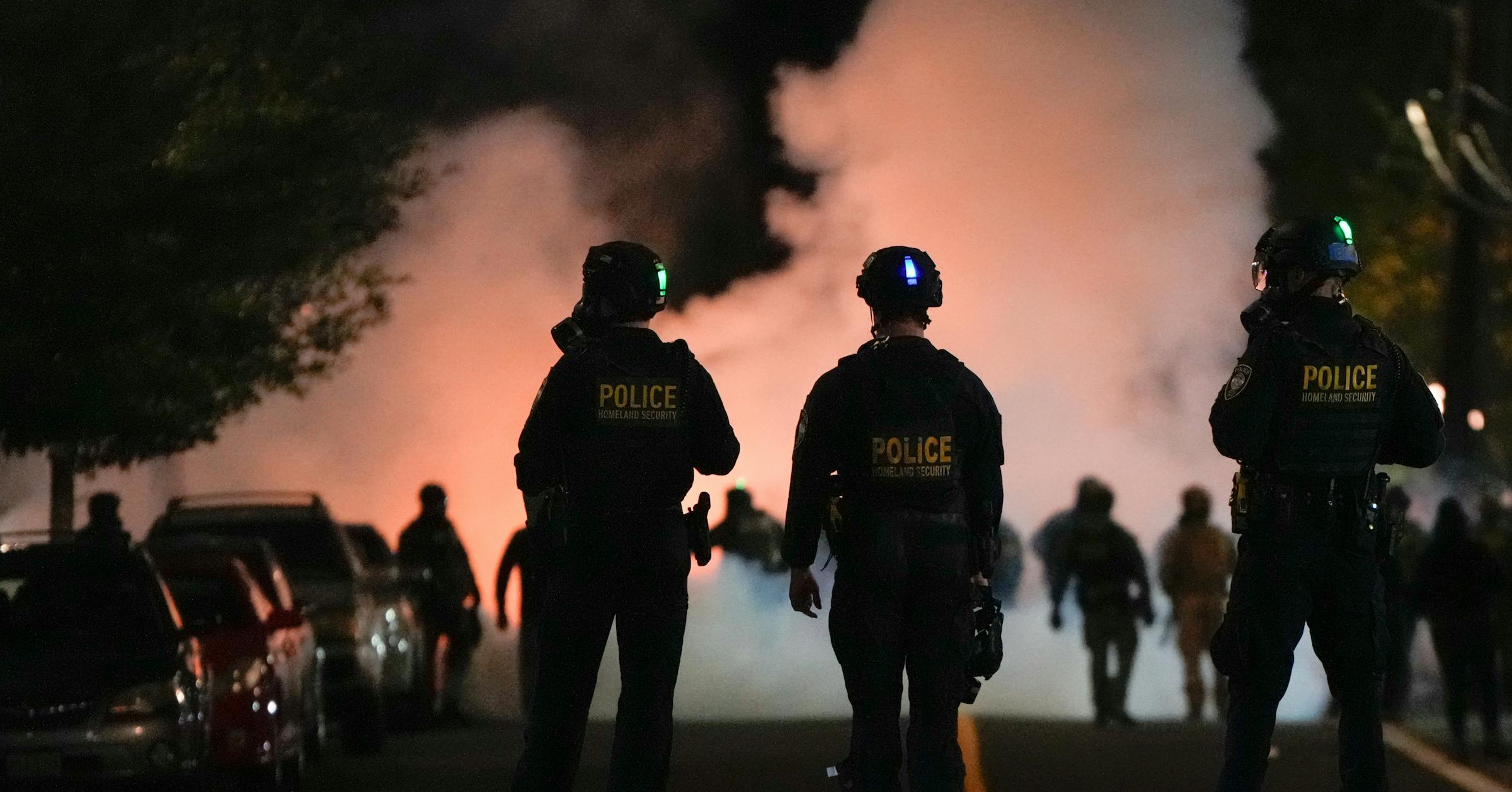
The hush seemed to disquiet the president, who often uses troops as props in his provocative politics. But military leaders have long maintained an apolitical ethos. They may also have been quieted by some stunning statements from Trump. Especially the commander-in-chief telling the generals and admirals that there was a “war from within” and that some big cities could be used as “training grounds” for the military.
That revelation came from extraordinary exclusive reporting in the Minnesota Star Tribune that originated from an individual concerned after viewing messages sent on the unsecured Signal messaging app — the same platform that in March was at the center of a scandalous security breach when a group chat about military strikes in Yemen inadvertently included the Atlantic magazine’s editor-in-chief.
“The key issue with Signal is that it’s supposed to be an encrypted, unclassified app regular people can use,” Jon Olson, a retired commander who spent 21 years in U.S. naval intelligence who now teaches courses in national security at Carleton College and the University of Minnesota’s Humphrey School, explained in an email interview. “It’s not a secure government communications channel; it is shocking this app has become the common means of communication, and leaks, in the Trump administration.”
These recent messages were evidently sent by Anthony Salisbury, a deputy to top White House adviser Stephen Miller, while Salisbury was in Minnesota for a funeral. The tipster, according to the Star Tribune, came forward over concern about the indiscreet display of such sensitive information.
“82nd is like our top tier for abroad. So it will cause a lot of headlines,” read one of the messages from Patrick Weaver, a Hegseth advisor. “Probably why he wants potus [president of the United States] to tell him to do it.”
In fact, the 82nd “is one of America’s most famous, capable and battle-hardened active-duty divisions,” said Bradley Bowman, senior director of the Foundation for Defense of Democracies’ Center on Military and Political Power.
The division, whose self-described mission, according to the division’s museum, is to “strategically deploy, conduct forcible entry parachute assault, and secure key objectives for follow-on operations in support of U.S. national interests,” has a storied history of heroics from World War I (when it was the 82nd Division), World War II, Vietnam, Grenada, Panama, the Gulf War, Afghanistan, Iraq and elsewhere — including in support of Hurricane Katrina search-and-rescue and relief operations.
“The 82nd is the U.S. Army’s 911 force, standing ready to deploy to fight foreign enemies,” Bowman said. “They are part of the beating heart of America’s active-duty combat forces that help keep Americans safe.”
Bowman cautions that the overeager deployment of our military forces within the U.S. is a mistake, “potentially putting service members in positions for which they are insufficiently trained, diminishing their readiness to perform the warfighting missions they exist to conduct and damaging the vital relationship between the military and the fellow citizens they serve.”
In the broader context, Bowman said, “using the U.S. military for domestic civilian law enforcement-related missions risks putting our troops in difficult positions, diminishing overall military readiness to combat foreign enemies and damaging civil-military relations at home.”
Hegseth emphasized warfighting in his address. Bowman supports a Pentagon focus on warfighting and believes deploying units such as the 82nd domestically reduces their readiness to conduct combat missions and leaves them less prepared for foreign crises and contingencies.
Such a deployment “probably does not meet the criteria laid out in the Insurrection Clause, and it most certainly violates the Posse Comitatus law,” Timothy R. Johnson, a University of Minnesota professor of political science and law, said, referencing two longtime legal constraints. “That is that the federal military are simply not allowed to perform police functions within the confines of the United States itself, that the military is meant as a foreign-policy organization, not as a domestic-policy organization for policing within the United States.”
Deploying National Guard troops is yet a different matter and is the subject of ongoing legal action from Democratic-led governments in Oregon and Illinois. Whether the U.S. Supreme Court ever gets involved remains to be seen, but because the administration has been so successful in serial appeals to the top court, Johnson said there’s a strong possibility the administration would win these cases too.
If so, Trump, congressional Republicans and like-minded media outlets will likely portray it as a victory for conservatives. But it’s really anything but, said Johnson.
“This gets to the heart of the polarization debate that we have in the United States today,” he said, adding that “by any classic definition of conservativism, going all the way back to Edmund Burke, or thinking about old-school Reagan Republicans, or thinking about President Lincoln as a Republican, this is not a conservative move. Conservativism at its heart is about moving slowly, moving deliberately, and also being a big protector of states’ rights.
“And certainly these decisions to send troops in, where governors, mayors, other local officials have said, ‘A, we don’t need them, and B, we don’t want them,’ seems to fly in the face of the traditional conservative view that we, the people of the United States, need to be protected from a strong, perhaps tyrannical federal government.”